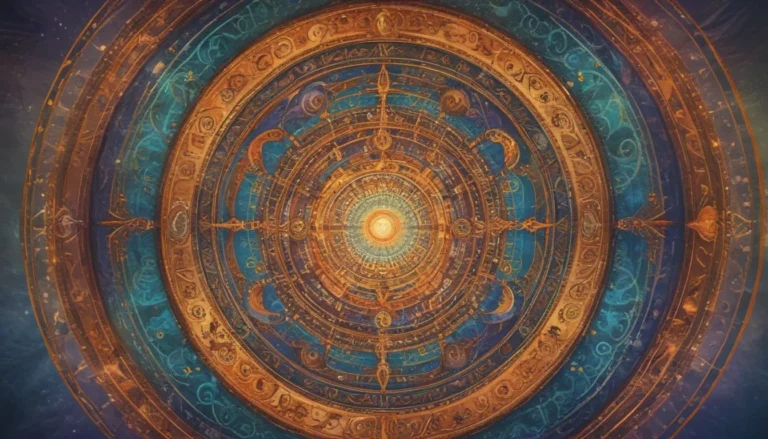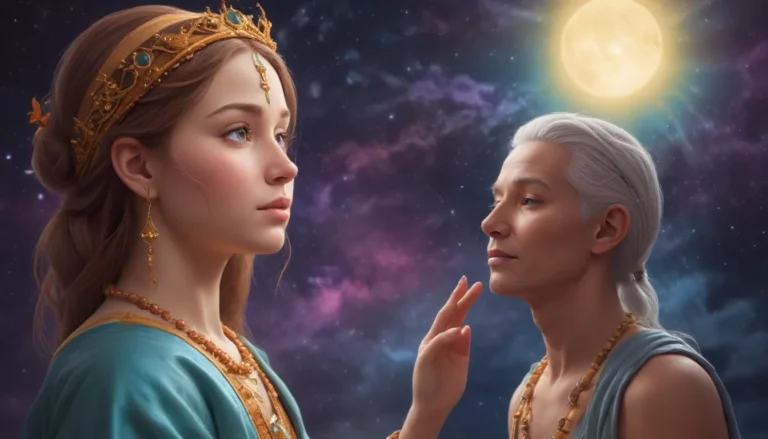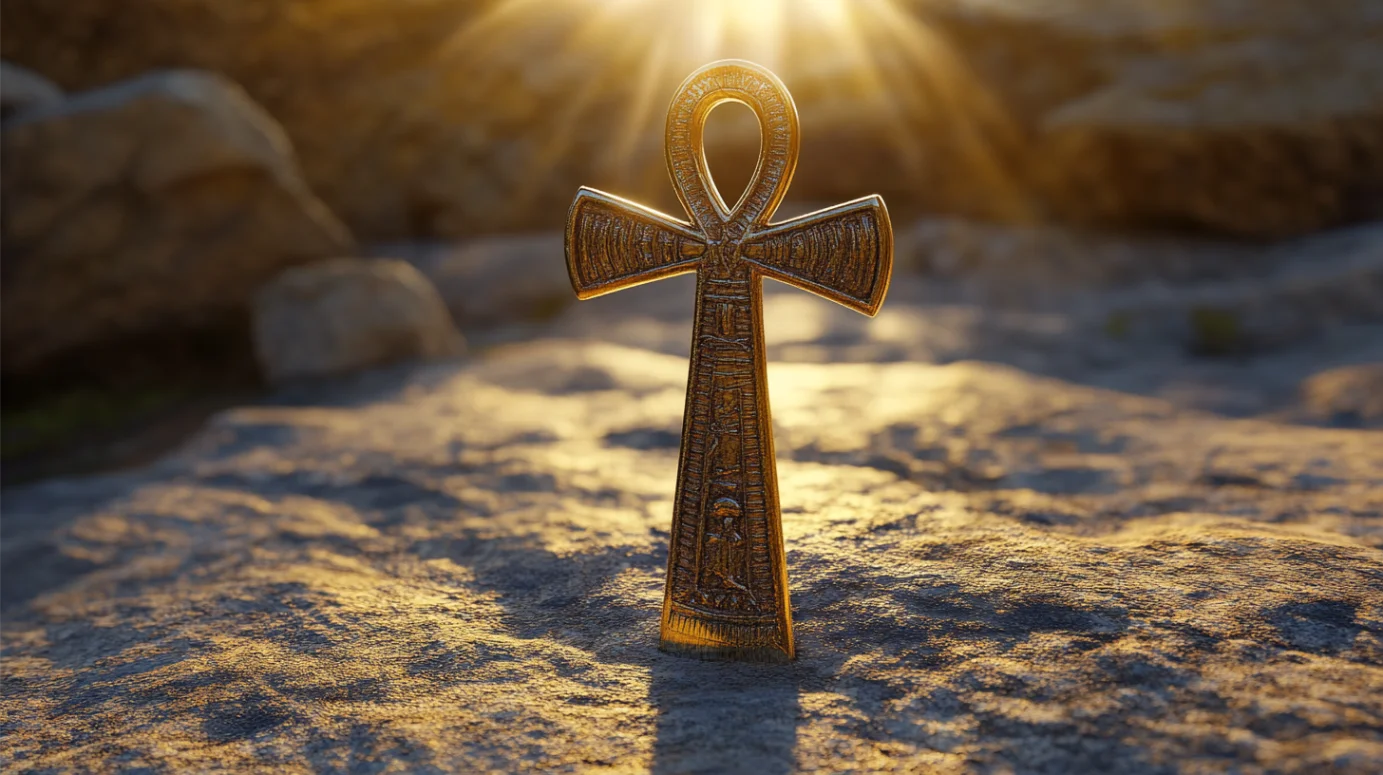
The ankh, an ancient Egyptian symbol, has captivated people for thousands of years. Its distinctive shape – a cross with a loop at the top – is instantly recognizable and holds deep spiritual significance. But what does this mysterious symbol really mean? Why has it endured for millennia, and what can it teach us about life, death, and the cosmos?
In this post, we’ll dive into the fascinating world of the ankh, exploring its origins, meanings, and why it continues to resonate with people today. Whether you’re a history buff, a spiritual seeker, or simply curious about ancient symbols, you’ll discover something intriguing about this powerful emblem of eternal life.
Key Takeaways:
- The ankh symbolizes eternal life and the union of male and female energies
- It was used by ancient Egyptians in religious and everyday contexts
- The ankh’s influence extends beyond Egypt, appearing in various spiritual traditions
- Understanding the ankh can offer insights into balance, vitality, and spiritual growth
What is the Ankh?
The ankh, also known as the key of life or the cross of life, is one of the most recognizable symbols from ancient Egypt. Its shape is simple yet profound: a T-shaped cross with a loop on top, resembling a key or a mirror. But this seemingly simple design holds layers of meaning that have fascinated scholars and spiritual seekers for generations.
In ancient Egyptian hieroglyphs, the ankh represented the concept of eternal life. It was often depicted in the hands of gods and pharaohs, symbolizing their power over life and death. But the ankh wasn’t just reserved for royalty and deities – it was a popular symbol worn by ordinary Egyptians as well, used in jewelry, decorative items, and even as a mirror handle.
The Spiritual Significance of the Ankh
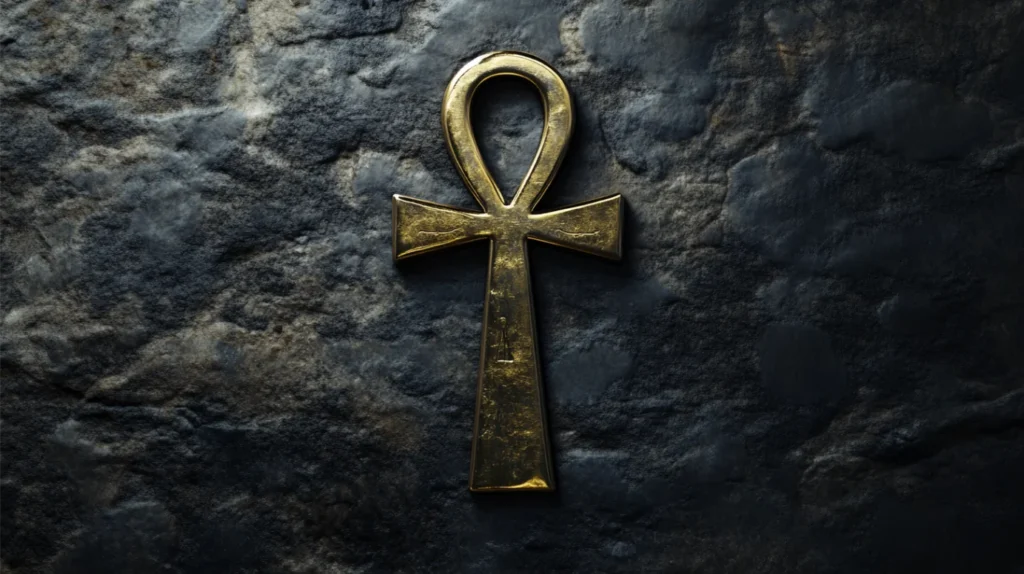
At its core, the ankh represents the union of opposites – a theme that runs deep in many spiritual traditions. The vertical line of the cross is often interpreted as masculine energy, while the horizontal line and loop represent feminine energy. Together, they form a complete whole, symbolizing the balance and harmony necessary for life to flourish.
But the ankh’s meaning goes beyond just male and female energies. It’s also seen as a representation of:
- The key to unlocking the mysteries of life and death
- The union of heaven and earth
- The flow of cosmic energy through all living things
- Eternal life and the cycle of birth, death, and rebirth
Have you ever felt a sense of connection to something greater than yourself? The ankh reminds us that we’re all part of a vast, interconnected web of life. It encourages us to seek balance in our lives and to tap into the universal life force that flows through everything.
The Ankh in Ancient Egyptian Culture
In ancient Egypt, the ankh wasn’t just a pretty symbol – it was a powerful tool used in religious and magical practices. Pharaohs were often depicted holding the ankh, symbolizing their divine right to rule and their ability to grant life to their subjects. Gods and goddesses, too, were frequently shown with the ankh, using it to bestow the breath of life upon mortals.
The ankh also played a role in everyday life. It was a popular amulet worn for protection and good fortune. Mirrors were sometimes shaped like ankhs, perhaps reflecting the idea that our physical reflection is just a small part of our eternal soul. Even water jugs were designed in the shape of the ankh, linking this life-giving liquid to the symbol of eternal life.
What if we looked at our own lives through the lens of the ankh? How might it change our perspective on the challenges and joys we experience every day?
The Ankh Beyond Egypt
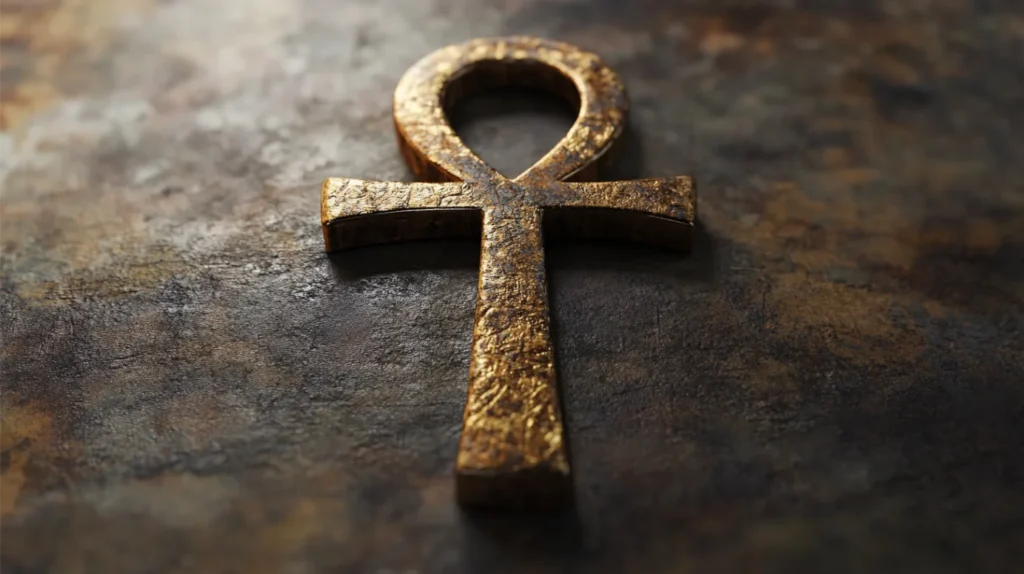
While the ankh is most closely associated with ancient Egypt, its influence has spread far beyond the banks of the Nile. In fact, you might be surprised to learn how this ancient symbol has popped up in various cultures and spiritual traditions around the world.
The Ankh in Christianity
When Christianity began to spread in Egypt, many early Coptic Christians adopted the ankh as a form of cross, seeing parallels between the ankh’s promise of eternal life and Christ’s message of salvation. This blending of symbols shows how powerful ideas can transcend cultural boundaries.
The Ankh in Modern Spirituality
Today, the ankh continues to be a popular symbol in various spiritual and New Age movements. Many people wear ankh jewelry or use it in meditation, seeing it as a conduit for positive energy and a reminder of life’s eternal nature.
The ankh’s enduring appeal speaks to its universal message. It reminds us that life is precious, that opposites can be reconciled, and that there’s more to existence than what meets the eye. How does this resonate with your own spiritual journey?
Table: Dreams and Symbols Related to the Ankh
| Symbol | Meaning | Relation to Ankh |
|---|---|---|
| Cross | Sacrifice, faith | Similar shape, spiritual significance |
| Key | Unlocking mysteries, access | Ankh is often called the “key of life” |
| Mirror | Reflection, self-knowledge | Ankh-shaped mirrors were used in ancient Egypt |
| Sun | Life force, vitality | Both represent sources of life energy |
| Lotus | Rebirth, purity | Both symbols of spiritual awakening |
| Tree of Life | Interconnectedness, growth | Both represent the continuity of life |
Incorporating the Ankh’s Wisdom in Daily Life
The ankh isn’t just a relic of the past – its wisdom can be applied to our modern lives in meaningful ways. Here are some ideas to consider:
- Seek balance: The ankh reminds us of the importance of balancing opposing forces. In your own life, how can you find harmony between work and play, action and rest, giving and receiving?
- Embrace life’s cycles: Just as the ankh represents eternal life, we can learn to see the cycles in our own lives. Every ending is also a new beginning. How might this perspective change the way you view challenges or setbacks?
- Connect with universal energy: The ankh symbolizes the flow of life force. Take time each day to connect with this energy through meditation, prayer, or simply being present in nature.
- Reflect on your eternal nature: Beyond our physical bodies, the ankh points to something eternal within us. How does this idea impact the way you live your life?
- Use it as a focal point: Many people find the ankh helpful in meditation or visualization exercises. Try using it as a mental image to focus on when you need to center yourself or tap into your inner wisdom.
Remember, you don’t need to be an ancient Egyptian or a spiritual guru to benefit from the ankh’s symbolism. Its message is universal and timeless, speaking to the human desire for meaning, balance, and connection to something greater than ourselves.
The Ankh in Modern Culture
The ankh’s influence isn’t limited to spiritual circles. This powerful symbol has made its way into popular culture, appearing in:
- Fashion: Ankh jewelry and clothing designs are popular, often worn as a statement of spirituality or connection to ancient wisdom.
- Art: Many modern artists incorporate the ankh into their work, exploring themes of life, death, and rebirth.
- Literature and film: The ankh often appears in stories dealing with Egyptian themes or exploring concepts of immortality.
- Music: Some musicians use the ankh as a symbol in their performances or album art.
This widespread use of the ankh shows how ancient symbols can remain relevant and meaningful in our modern world. It’s a testament to the universal appeal of its message and the human desire to connect with something timeless and profound.
Conclusion: The Eternal Message of the Ankh
As we’ve explored, the ankh is far more than just an ancient Egyptian symbol. It’s a powerful reminder of the eternal nature of life, the importance of balance, and our connection to the cosmic energy that flows through all things. Whether you’re drawn to its historical significance, its spiritual symbolism, or simply its elegant design, the ankh has something to offer everyone.
What aspect of the ankh’s meaning resonates most with you? How might you incorporate its wisdom into your daily life? Remember, the true power of any symbol lies not in the symbol itself, but in how it inspires us to live, love, and grow. May the ankh’s timeless message of life and balance guide you on your own spiritual journey.
